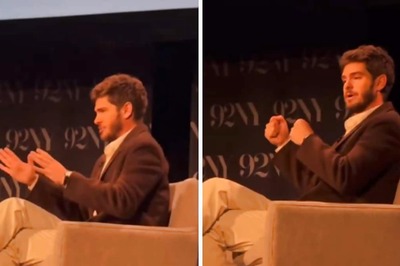
views
The Bharatiya Janata Party and Congress have been in a war of words over the appointment of BJP leader and seven-time MP Bhartruhari Mahtab as pro tem speaker, a post active only for the first days of a new Parliament. The 18th Lok Sabha will be convened on Monday. The Congress, which was expecting its senior MP K Suresh to be appointed to the post, was irked. Senior leader KC Venugopal called it “an attempt to destroy democratic and parliamentary norms…”
Pro tem speaker is a temporary presiding officer of the Lok Sabha appointed by the President of India to administer oath of office to newly elected members and preside over the election of the Speaker of the House. The system of appointing a pro tem speaker in India is adopted from the ‘Father of the House’ convention in the UK’s Westminster system of parliament which states that this title is bestowed on the member who has the longest unbroken service in the parliament and this member will be responsible for presiding over the House until the Speaker is elected.
By that convention, BJP sources pointed out, Bhartruhari Mahtab who has served seven consecutive terms as Lok Sabha MP qualifies for the post of pro tem speaker and has been appointed as such.
This allegation of the Congress clearly falls flat, they said, as Suresh Kodukkunil has only served 8 nonconsecutive terms, having lost in 1998 and 2004. This means that this is only his 4th consecutive term as Lok Sabha MP, thus not qualifying him for the post of pro tem speaker.
In the 17th Lok Sabha too, the same convention was followed with Virendra Kumar being appointed as pro tem speaker by the President as he was the longest-serving consecutively elected member of the parliament then. Maneka Gandhi who was the senior-most MP but in non-consecutive terms was not selected as pro tem speaker accordingly.
The Congress also further accused the government of breaching parliamentary norms and insulting the Constitution by appointing Mahtab as pro tem speaker. BJP sources pointed out that in 2004, the Congress “breached” these parliamentary norms as it recommended to the President to appoint Balasaheb Vikhe Patil, who was serving his 8th term as MP, as pro tem speaker of the house for the election of Speaker. This was despite the fact that there were more senior members like Atal Bihari Vajpayee and George Fernandes who were serving their 10th and 9th terms, respectively.
There have been many previous instances where the convention of appointing the senior-most MP as pro tem speaker was not followed. In 1956, Sardar Hukam Singh was appointed to the post even though he was not the senior-most MP. In 1977 too, DN Tiwari was appointed as pro tem speaker even though he was
not the senior-most member of the House.
In 2018, hearing a case filed by the Congress that the appointment of a particular MLA as pro tem speaker by the government was unlawful as he was not the senior-most member of the House, the Supreme Court clearly said that there is no such rule and that conventions are not rules to be enforced. The SC did not accept Kapil Sibal’s arguments on this and quoted many previous instances in which members other than senior-most MP/MLA have been appointed as pro tem speakers.
The rules of procedure of the Lok Sabha also state that though normally the senior-most member of parliament is chosen as pro tem speaker, there have been exceptions to this practice.
















Comments
0 comment